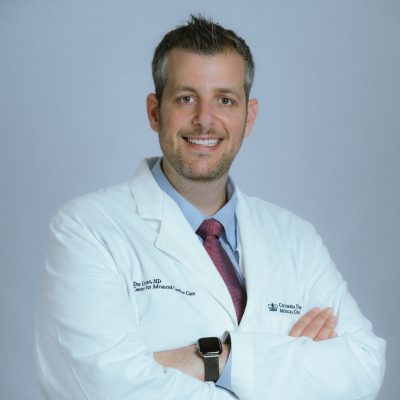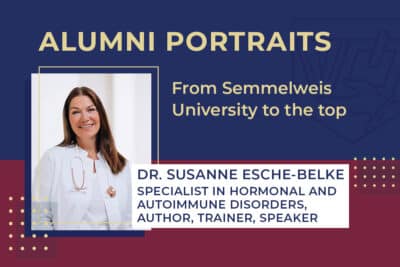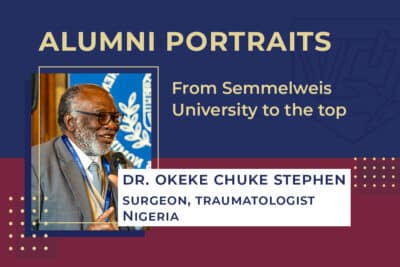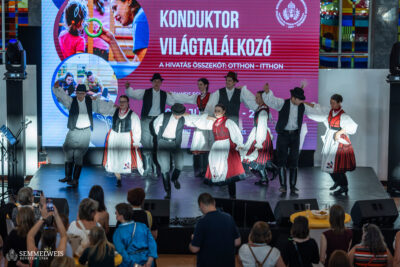What was your motivation to become a doctor?
From an early stage in life, I knew that becoming a doctor was my calling. Being the son of a physician, I felt as if it was my destined path. At the age of 16, I volunteered in the national ambulance service as part of a mandatory school program, and during that time, I truly felt a strong connection with this profession – it ignited a genuine passion within me, so to say.
How did you find Semmelweis University and why did you choose it to be your medical school?
Right after completing my army service at the age of 21, I made the firm decision to pursue a career in medicine. At that time, I had a close friend who was attending a pre-med program, and I decided to visit him in Budapest. The moment I arrived, I was captivated by the city’s vibrant life and rich culture. I instantly felt that this was the place where I wanted to pursue my medical education, so a couple of weeks later, I applied for the pre-med program in Budapest. As I progressed through pre-med, I actively researched various medical school programs in Hungary, and Semmelweis University consistently stood out as a top choice. One of the main reasons I chose this institution was due to the realization that studying in a city with top-tier hospitals would provide me with a wide exposure to diverse medical cases. I knew that encountering challenging medical conditions and gaining extensive training in such an environment would significantly enhance my skills as a future doctor. Hence, Semmelweis became the ideal destination for my medical journey.
Tell us about your university years – what was the most memorable from those years?
 When I started my first year in medicine back in 2006, I was 21 years old. I vividly recall those initial days at the university – they were overwhelming yet filled with excitement, especially since I was transitioning from the Middle East to Europe. The cultural differences were evident, and it took some time to adjust. One thing that struck me from the beginning was the awe-inspiring historic buildings where our classes were held. Being in that space made me feel that I was becoming part of the university’s rich history. Knowing that great scientists and physicians had occupied the same chairs I sat in filled me with pride and motivation. The first few years were undoubtedly challenging. Balancing the cultural shift, overcoming language barriers, all while receiving a high-level medical education profoundly shaped my life for the better. I was truly impressed by the top-notch education I received compared to my friends attending medical schools worldwide. All in all, my university years marked the best phase of my early career life. Also, the friendships I built with both Hungarians and students from across the globe endure even today.
When I started my first year in medicine back in 2006, I was 21 years old. I vividly recall those initial days at the university – they were overwhelming yet filled with excitement, especially since I was transitioning from the Middle East to Europe. The cultural differences were evident, and it took some time to adjust. One thing that struck me from the beginning was the awe-inspiring historic buildings where our classes were held. Being in that space made me feel that I was becoming part of the university’s rich history. Knowing that great scientists and physicians had occupied the same chairs I sat in filled me with pride and motivation. The first few years were undoubtedly challenging. Balancing the cultural shift, overcoming language barriers, all while receiving a high-level medical education profoundly shaped my life for the better. I was truly impressed by the top-notch education I received compared to my friends attending medical schools worldwide. All in all, my university years marked the best phase of my early career life. Also, the friendships I built with both Hungarians and students from across the globe endure even today.
What steps did you decide to take after graduation?
During my 5th year of medical school, while attending cardiology lectures, I realized without a doubt that becoming a cardiologist was my true calling. The field’s constant advances, innovative breakthroughs, and the complexity of the diseases fascinated me deeply. At that stage, I hadn’t yet determined a specific location for accomplishing my dream, so I resolved to keep my options open and explored various possibilities. As a result, I embarked on the journey of completing the USMLE (the United States Medical Licensing Examination) steps by the end of my 6th year. Upon graduation, a crucial decision awaited me – whether to apply for residency in the USA or return to my home country. Ultimately, I made the choice to pursue both my internal medicine and cardiology training in Israel, with the hope that someday I would apply for an advanced fellowship in the USA to gain further invaluable experience in my chosen field.
How did you get the chance to work in the USA at Columbia University?
During my cardiology fellowship, I found myself captivated by the fascinating field of cardiomyopathies, heart failure, heart transplantation, and hemodynamics. Above all, it was the constant innovation and groundbreaking advancements in this area that inspired me to pursue an advanced fellowship in this specialized field. Among the options, the Columbia University – New York Presbyterian Advanced Heart Failure Program stood out prominently. It boasts one of the largest programs in the country, performing nearly 100 heart transplants and 60 left ventricular assist devices annually. Moreover, the program is spearheaded by a world-renowned cardiologist, and their dedication to pushing the boundaries of medical innovation was simply exceptional. With immense gratitude, I received the acceptance after a series of interviews, and I commenced my one-year fellowship. The experience proved so rewarding that it led to an extension of my training for an additional two years. Upon completion, I received an invitation to join the esteemed faculty of physicians at Columbia University, marking a significant milestone in my career journey.
Could you elaborate on the benefits of working abroad?
Medicine does exhibit some variability between countries, despite its foundational principles remaining constant. Different regions may have diverse approaches to treatment, varying levels of available technology and diagnostic tests, and dissimilar healthcare systems. These differences can significantly impact the way we work as medical professionals. For instance, managing a patient in a ‘free healthcare system’ can differ significantly from dealing with a healthcare system that relies on reimbursements from insurance companies. The latter may impose limitations on certain treatments or procedures. Navigating these varying systems requires flexibility and a willingness to adapt, ensuring the best care possible for our patients, regardless of the environment we find ourselves in.
What captivated you the most in cardiology?
The multidisciplinary nature of this field is simply awe-inspiring. Unlike many other specialties, cardiology offers a remarkable opportunity to serve as the primary case manager for patients while having access to surgical and interventional capabilities, making it an incredibly diverse and captivating field. This diversity and the complexity of cases are what truly make it unique and endlessly interesting. As a cardiologist, I am committed to embracing the challenges, staying at the forefront of advancements, and making a difference in the lives of those entrusted to my care.
What are your research fields and why did you decided to select those?
During my internal medicine residency, my primary focus has been on advanced heart failure, pericardial diseases, cardiovascular hemodynamics, and cardiogenic shock. Over the years, I have authored several book chapters on pericardial diseases, which have been included in leading textbooks such as the cardiovascular disease textbook by the European Society of Cardiology. I have participated in numerous retrospective research studies and prospective clinical trials as well, all aimed at advancing our understanding of cardiology. At my present institute, I am currently leading a prospective clinical trial that involves remote monitoring devices for patients supported with left ventricular assist devices (LVADs). Moreover, I am deeply involved in research concerning donor-derived cell-free DNA and heart transplant recipients, as well as utilizing microcirculation cameras to assess end-organ perfusion in the context of advanced heart failure and cardiogenic shock. I firmly believe that we can improve the lives of those suffering from cardiac ailments through rigorous research and compassionate patient care.
What would you highlight from your life and career that you can thank to your alma mater?
As a fresh graduate, I had concerns about how well I would adapt to a new healthcare system in a different country. However, I quickly realized that the strong foundation in basic sciences, anatomy, and physical examination skills I had acquired during my university years gave me a significant advantage in efficiently treating patients. This solid grounding also provided me some leeway to learn from any mistakes and adjust to the new healthcare system at my own pace. Besides all that, one particularly heartwarming memory stands out: I was presenting at the European Society of Cardiology conference several years ago, and as I unexpectedly crossed paths with my cardiology tutor, Dr. Dávid Becker. He was the mentor who had taken me under his wings back in 2011, allowing me to shadow him in the catheterization lab during my free time. His support were pivotal in affirming my love for this field. To reunite with him many years later, express my gratitude, and remind him of the profound impact he had on my journey was a truly heartwarming moment. Similarly, another one of my tutors, Dr. Béla Merkely, who had examined me during my training, has since risen to become the Vice President of the ESC and Rector of the university. Having the opportunity to reconnect with him after all these years, and share memories of the past, is a testament to the power of building strong connections and the enriching experience of studying abroad.
Do you have any hobbies that occupy your mind, apart from medicine?
Well, over the past 11 years since graduation, my focus has been on developing my career and expanding my medical knowledge. During my free time, I dedicated myself to research and spending quality moments with my family and friends. However, now, as a father of two wonderful babies, all of my spare time is devoted to my family. I must say that this new chapter in my life brings me immense joy. No matter what challenges I face at work during the day, the moment I step into my home and spend time with my children, it all melts away. Being with my family not only rejuvenates my mind but also reminds me of the important things in life beyond my medical career. Embracing this role as a parent has brought a balance to my life, making every moment precious and fulfilling.
What advice would you share with today’s students, residents and PhD students regarding university years, life, and career?
I believe that in the world of medicine, building connections, showcasing dedication, and putting in hard work, along with nurturing good international relationships, can pave the way to success in any career path. I encourage any young trainee to expand their interests fearlessly, and step into uncharted fields such as research. I recommend focusing on areas of genuine interest and work diligently to build connections and excel in that chosen field. Do not be afraid to alter your route along the way; the choices made now do not necessarily dictate your future practice. Early actions, such as volunteering within the university or hospital to enhance education or training, engaging in research to develop skills in scientific writing and biostatistics, attending medical courses, and participating in conferences, all contribute significantly to future opportunities. Finally, I would like to emphasize the importance of dreaming BIG! When I was a second-year student, I spent my summer vacation in New York City, and had a profound impact on my aspirations. Witnessing a physician wearing scrubs on Fifth Avenue, I shared my dream with my mother that one day I would be like him. Despite being a foreign medical student in Hungary and then a foreign medical graduate in Israel, I was able to fulfill that dream and become a foreign physician in New York. I encourage all aspiring medical professionals to seize opportunities, believe in their dreams, and embrace the journey with determination and passion.
Alumni Directorate


